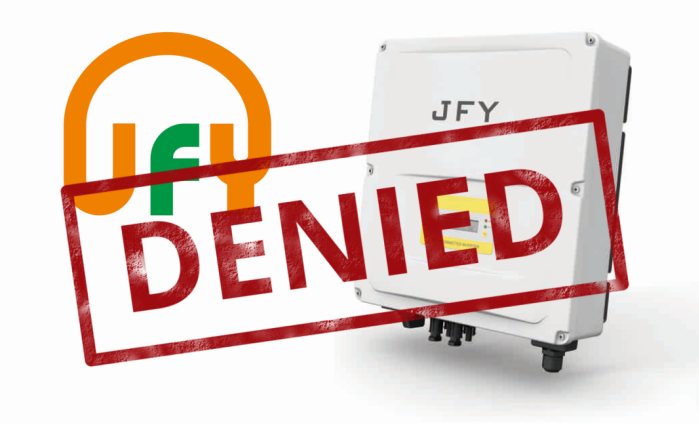
A Clean Energy Council decision to delist a solar inverter model manufactured by Shenzhen JingFuYuan Tech (JFY) has been upheld after an appeal from the company was unsuccessful. The situation has also flagged what may be broader issue.
Late last month we reported JFY was one of two companies whose solar inverters were removed from the CEC’s Approved Products List, in part due to potential safety issues.
All JFY solar inverters were delisted on the basis of the inverter model tested (Sunleaf 3000TL) considered indicative of other models until proven otherwise.
The non-conformance issues reported by the CEC:
- Non-compliant inverter labeling
- Installation manual non-compliant and misleading
- Passive anti-islanding non-compliant
- Incorrect PV connector information supplied
- ERAC Registration of inverters non-compliant
- Misleading datasheet
- No warranty offered and no warranty document available1
The Passive anti-islanding issue identified could lead to the inverter not shutting down under some conditions where grid failure has occurred said the CEC. Anti-islanding failing poses a potential safety threat to workers addressing a blackout and may cause damage to grid equipment such as transformers.
“Wrong Inverter Settings”
The CEC states JFY’s appeal was lodged based on the claim the wrong settings were used on the inverter during the testing process. However, the CEC’s Product Listing Review Panel says this was due to the inverters being imported into Australia with the incorrect settings.
“No information was provided advising installers that they had to re-set the inverters to the correct Australian settings, nor was any guidance provided as to the correct settings to be used when installing the product,” states the Panel’s decision.
The Panel also noted JFY didn’t deny the inverter model in question had breached applicable standards and listing terms and conditions.
“In its decision the Product Listing Review Panel made it clear that this matter involved serious and clear breaches of the International and Australian Standards and the CEC’s Terms and Conditions for listing, and the CEC followed the correct procedure for testing and de-listing,” stated the CEC in yesterday’s member update.
Settings A Wider Issue?
In its update, the CEC also noted the failure of two of the first three inverters tested for compliance with AS 4777.2 for passive anti-islanding settings suggests there could be a broader industry issue, and urged all parties in the inverter supply chain to check the situation with any units they sell or install. It says it appears that the country code for Australia was not set at the factory in both instances.
In order to be eligible for Australia’s major solar subsidy, solar panels and inverters used in installations must be included on the relevant Approved Products List.
The CEC denying JFY’s appeal will send an even clearer signal to solar panel/inverter manufacturers and importers that delisting under such circumstances is a serious issue and not simply a smack on the wrist that may be easily rectified. With the CEC also communicating delisting decisions more broadly, the stakes are much higher as installers and end-consumers will become increasingly aware of such incidents, which may influence their choice of solar power system components.
Footnotes
- Clause 14 of the CEC inverter terms and conditions of listing state: “The importer or local manufacturer of a listed inverter or PCE shall maintain a website accessible to the public on which customer documentation required under the CEC listing process is made available to consumers. This includes datasheet, install manual and warranty” ↩

 RSS - Posts
RSS - Posts



Regarding the warranty coverage, having had a system fail before the applicable warranties expired (about three years after installation), and then, being advised by the local government agency supposedly responsible for consumer prottection (which the state government decided, should be buried within the department of mines…), that no warranty applies, as the manufacturer has no presence in Australia, and the installation company is defunct, the CEC should require that any components that are approved by the CEC, should have a manufacturer’s presence in Australia, for the duration of the documented warranties.
When no consumer protection exists, due to an absence of effective warranty coverage, with PV systems that fail after about three years, if does not bode well for the PV industry in Australia, and, the CEC should be acting to protect both the consumers and the industry, by requiring effective and enforceable warranty protection on products that are approved by the CEC.
Another possibility, involving a requirement for warranty protection, is for an industry warranty coverage insurance scheme to be established and implemented, as mandatory for all accredited installers and spproved components, requiring all PV installations to be covered by warranty protection insurance, whereby, if the components manufacturers and/or installers, do not have a physical and trading presence in Australia, with provision therein to repair/replace failed components, at the time of any possible warranty claims, the warranty protection insurance provides replacement with components/systems of the same capacity and capability, including all associated labour costs, with the risks associated with each component and system, for the purpose of allocating the particular specific insurance premiums, being determined by actuaries, based on the standing of the installers and the manufacturers of the constituent components in each system.
Whichever system would be implemented, the PV industry in Australia, needs to have enforceable warranty protection for consumers, which is lacking at present, to retain and repair the credibility of the industry, as the absence of enforceable warranty protection for consumers, is not good for the industry, and, is espcially, not good for us, the consumers.